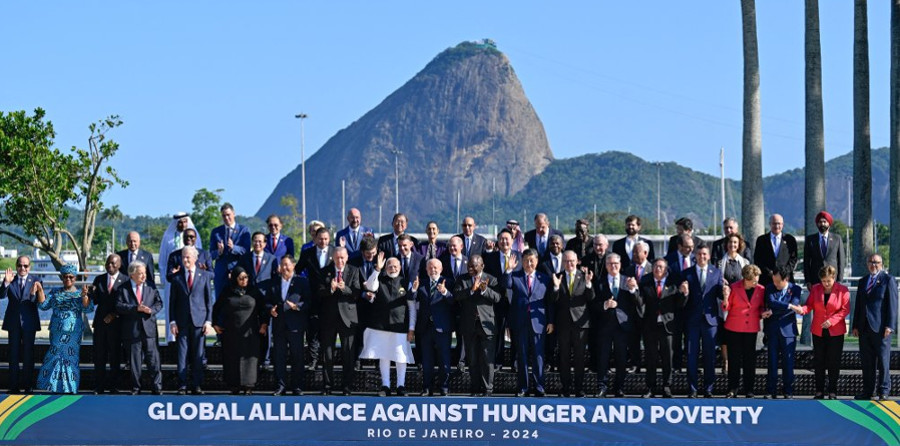|
The G20 fumbles food politics, pleasing agribusiness G20 starves us of food sovereignty The host country’s appalling record of starving workers in the extractive industry class war dare not be mentioned. What else is off the agenda? Words like “profit” and “multinational corporation” and “intellectual property” and “genetic engineering” and “carnivore” are not to be found, because they are assumed to be a natural part of the food process – although all undermine food sovereignty and climate sanity. Reforms like “land redistribution” and “agro-ecology” and genuine black empowerment would, after all, violate the G20 commitment to “pursuing actions that are in compliance with WTO rules and obligations,” as seen below. The G20 statement is intent on ignoring these concerns, and instead retains ‘food security’ phraseology without any concession to the food sovereignty movement. That movement, according to London-based Global Justice Now (in a 2019 report) has these components: 1. Focuses on food for people: The right to food which is healthy and culturally appropriate is the basic legal demand underpinning food sovereignty. Guaranteeing it requires policies which support diversified food production in each region and country. Food is not simply another commodity to be traded or speculated on for profit. 2. Values food providers: Many smallholder farmers suffer violence, marginalisation and racism from corporate landowners and governments. People are often pushed off their land by mining concerns or agribusiness. Agricultural workers can face severe exploitation and even bonded labour. Although women produce most of the food in the global south, their role and knowledge are often ignored, and their rights to resources and as workers are violated. Food sovereignty asserts food providers’ right to live and work in dignity. 3. Localises food systems: Food must be seen primarily as sustenance for the community and only secondarily as something to be traded. Under food sovereignty, local and regional provision takes precedence over supplying distant markets, and export-orientated agriculture is rejected. The ‘free trade’ policies which prevent developing countries from protecting their own agriculture, for example through subsidies and tariffs, are also inimical to food sovereignty. 4. Puts control locally: Food sovereignty places control over territory, land, grazing, water, seeds, livestock and fish populations on local food providers and respects their rights. They can use and share them in socially and environmentally sustainable ways which conserve diversity. Privatisation of such resources, for example through intellectual property rights regimes or commercial contracts, is explicitly rejected. 5. Builds knowledge and skills: Technologies, such as genetic engineering, that undermine food providers’ ability to develop and pass on knowledge and skills needed for localised food systems are rejected. Instead, food sovereignty calls for appropriate research systems to support the development of agricultural knowledge and skills. 6. Works with nature: Food sovereignty requires production and distribution systems that protect natural resources and reduce greenhouse gas emissions, avoiding energy-intensive industrial methods that damage the environment and the health of those that inhabit it. In addition to ignoring these principles, the most important part of any G20 official statement is silence about – and thus disrespect for – civil society. The G20 statement on food has nothing to say about the courageous movements around the world, e.g. the Via Campesina network, whose members have struggled valiantly for land redistribution and pro-peasant policies. These civil society groups should have no expectation of being taken seriously by the G20 in Johannesburg, within a country where more than 12 million of the 62 million population is considered to be food insecure, led by a hedonistic ruling class that exudes subimperial obeisance to agricultural imperialism. The G20 Food Security Task Force is a case in point. Back Patrick Bond, Distinguished Professor of Sociology, is a political economist, political ecologist and scholar of social mobilisation. From 2020-21 he was Professor at the Western Cape School of Government and from 2015-2019 was a Distinguished Professor of Political Economy at the University of the Witwatersrand School of Governance. From 2004 through mid-2016, he was Senior Professor at the University of KwaZulu-Natal School of Built Environment and Development Studies and was also Director of the Centre for Civil Society. Patrick also served as visiting professor at Gyeongsang National University, South Korea and as an associate of the Leverhulme Centre for the Study of Value at the University of Manchester. |
|
||||||
|
|||||||




